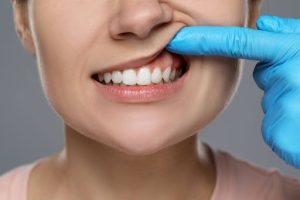Visit Drs. Burgess, Roth, and Randall for Periodontal Care When You Need It Most
Have you noticed your gums bleeding more during certain times of the month? Or perhaps you’re experiencing unexpected gum sensitivity during pregnancy? If so, you’re not alone. The connection between hormones and gum health is more significant than many women realize, and understanding this relationship can help you protect your smile during vulnerable periods.
At Madison Dental Care, Dr. Burgess, Dr. Roth, and Dr. Randall have over 35 years of experience treating hormone-related gum issues affecting women throughout North Alabama, including Athens, Huntsville, and Decatur. If you’re experiencing problems related to hormonal changes, don’t wait to seek gum disease treatment near you. Call our Madison dental office at (256) 772-2626 to schedule a comprehensive periodontal evaluation.
How Do Hormones Influence Gum Health in Women?
 Hormones play a powerful role in your body’s inflammatory response, including how your gums react to plaque bacteria.
Hormones play a powerful role in your body’s inflammatory response, including how your gums react to plaque bacteria.
- Estrogen: Increases blood flow to gums
- Progesterone: Alters gum tissue response to plaque toxins
- Cortisol: Suppresses immune function when elevated
When these hormone levels fluctuate—during puberty, menstruation, pregnancy, or menopause—your gums become more sensitive to bacteria, making them more susceptible to inflammation, bleeding, and periodontal disease.
During times of hormonal change, women may experience pregnancy gingivitis, menstruation gingivitis, or menopausal gingivitis.
Common Symptoms of Early Gum Infection
- Red, swollen gums
- Tender gum tissue
- Bleeding during brushing or flossing
- Heightened inflammatory response to plaque
Hormonal Life Stages & Gum Health
Can Pregnancy Affect My Gum Health?
Pregnancy dramatically impacts gum health, with studies from the CDC showing that 60-75% of pregnant women develop some form of gingivitis. The surge in progesterone levels during pregnancy increases blood flow to gum tissue and changes how your body responds to the bacteria in plaque. This creates ideal conditions for pregnancy gingivitis.
 Timeline:
Timeline:
- Typically appears in the second trimester
- Often worsens in the third trimester
- May resolve after delivery
Pregnancy Gingivitis
- Increased sensitivity and inflammation
- Requires professional monitoring
Pregnancy Tumors
- Non-cancerous growths on the gums
- Appear red and bleed easily
- Usually resolves after delivery
- May require treatment if interfering with eating or hygiene
Bad breath during pregnancy is another common complaint, often resulting from hormonal changes that alter saliva composition and increase bacterial growth. Morning sickness can also contribute to bad breath and enamel erosion from stomach acid exposure. Maintaining excellent oral hygiene and visiting your dentist for specialized deep cleanings helps protect both your gum health and your baby’s wellbeing, as research links severe gum disease during pregnancy to preterm birth and low birth weight.
Birth Control and Oral Health
 Hormonal birth control methods, including oral contraceptives, patches, and intrauterine devices, can also affect your gums. The synthetic hormones in these contraceptives may increase inflammation and sensitivity, particularly during the first few months of use. Women taking birth control pills may experience more pronounced inflammation or even bleeding gums when tooth decay is present, making good oral hygiene even more important.
Hormonal birth control methods, including oral contraceptives, patches, and intrauterine devices, can also affect your gums. The synthetic hormones in these contraceptives may increase inflammation and sensitivity, particularly during the first few months of use. Women taking birth control pills may experience more pronounced inflammation or even bleeding gums when tooth decay is present, making good oral hygiene even more important.
If you’re considering starting birth control or have recently begun a hormonal contraceptive, inform both your gynecologist and your dentist so they can monitor your gum health appropriately.
How Does Endometriosis Impact Gum Health?
Emerging research suggests a connection between endometriosis and periodontal health. Endometriosis, a condition where tissue similar to the uterine lining grows outside the uterus, creates chronic inflammation throughout the body. This systemic inflammatory state may contribute to increased periodontal inflammation and a higher risk of gum disease.
Women with endometriosis often experience dysregulated immune responses and elevated inflammatory markers, which can compromise the body’s ability to fight the bacteria that cause periodontal disease. Additionally, some medications used to treat endometriosis can impact oral health by reducing saliva flow or altering hormone levels, further complicating gum health management.
How Does Stress Affect Gum Disease Progression?
Stress deserves special attention when discussing hormones and gum health. Chronic stress elevates cortisol levels, which suppresses immune function and increases inflammation throughout your body—including your gums. When you’re stressed, your body is less effective at fighting the bacteria that cause periodontal disease, allowing gum infections to progress more rapidly.
Stress also leads to behaviors that may create oral health problems:
- Grinding teeth
- Neglecting oral hygiene routines
- Craving inflammatory foods
- Smoking
Hormonal changes associated with the menstrual cycle can lead to fluctuations in cortisol levels. The combination of elevated cortisol, compromised immunity, and poor self-care creates a perfect storm for gum disease development and progression.
Menopause and Gum Health
Menopause brings another significant hormonal shift that affects gum health. Declining estrogen levels can lead to decreased bone density, including in the jawbone that supports your teeth. Some women going through menopause experience burning mouth syndrome, altered taste, or dry mouth—all of which can increase periodontal disease risk. Postmenopausal women should be especially vigilant about gum health, as bone loss in the jaw can accelerate tooth loss when combined with periodontal disease.
How Madison Dental Care Can Help
 At Madison Dental Care, we understand the unique challenges women face regarding hormone-related gum issues. Our comprehensive approach includes personalized periodontal treatments designed for your specific needs. Dr. Burgess, Dr. Roth, and Dr. Randall offer:
At Madison Dental Care, we understand the unique challenges women face regarding hormone-related gum issues. Our comprehensive approach includes personalized periodontal treatments designed for your specific needs. Dr. Burgess, Dr. Roth, and Dr. Randall offer:
- Scaling and Root Planing, deep cleaning procedures for gum disease
- Antibiotic Therapy to eliminate the infection
- Soft Tissue and Bone Grafting for gum recession
- Dental Implants for tooth loss caused by advanced periodontitis
We develop customized maintenance schedules that account for your hormonal cycles and life stages to prevent gum disease recurrence during vulnerable periods. Whether you’re navigating pregnancy, managing endometriosis, taking birth control, or experiencing menopausal changes, professional periodontal care makes a significant difference in maintaining healthy gums.
Protect Your Smile at Every Stage of Life
Understanding how hormones influence your gum health empowers you to take proactive steps throughout your life. Don’t let hormonal changes compromise your smile and oral health. Contact Madison Dental Care today to schedule your appointment with our experienced dental team.
Call our Madison dental clinic at (256) 772-2626 to learn more about protecting your periodontal health. We proudly serve patients from Madison, Huntsville, Athens, and Decatur at our conveniently located Palmer Plaza office. Our friendly team is ready to help you achieve optimal gum health at every stage of life.

